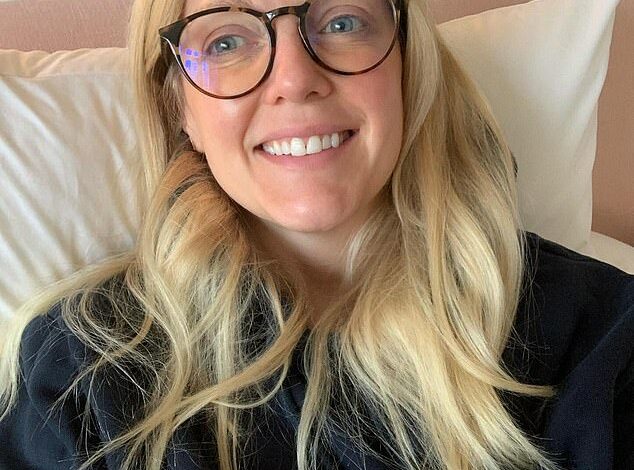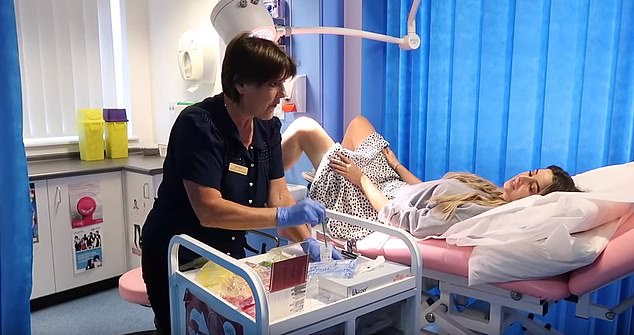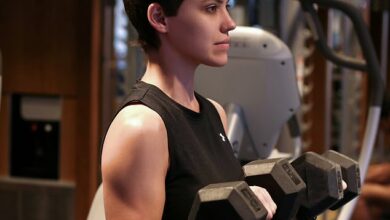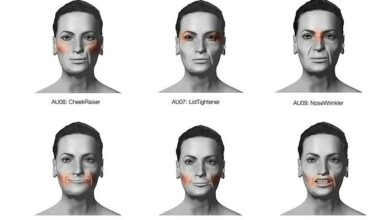The life-saving screening tests that could have spotted Lauren Laverne’s ‘unexpected’ cancer at 46… and which ones young people MUST have













BBC star Lauren Laverne today revealed she is undergoing cancer treatment after the disease was ‘unexpectedly’ picked up during a screening test.
The DJ, 46, who presents BBC Radio 4’s Desert Island Discs, said it had ‘thank God’ been caught early.
In an Instagram post, she told fans she was expected to make a ‘full recovery’ but did not reveal which cancer she had been diagnosed with.
NHS screening programmes have long been lauded by experts as a key way to help diagnose cancers earlier. The services are thought to save around 10,000 lives a year, according to research by The Nuffield Trust.
Yet, just one is routinely offered to under 50s like Ms Laverne. However, you should be offered others if you are considered high-risk of the disease, for instance due to a family history.
Here, MailOnline reveal which screening tests younger Brits should be entitled to.

BBC star Lauren Laverne has today revealed she is recovering from cancer and said the disease had ‘thank God’ been caught early

Laverne pictured with her television producer and DJ husband Graeme Fisher. The couple wed in 2005

Laverne took over on Radio 4’s Desert Island Discs when Kirsty Young stepped away from her role for a brief period because of her fibromyalgia treatment
Cervical Screening
While Lauren Laverne hasn’t revealed which cancer she has been diagnosed with, the only NHS screening service available to all under 50s is a cervical screening check.
Currently women aged 25 to 49 are invited for the check at their GP surgery every three years. For those aged between 50 and 64, it is offered every five years.
Screening is arguably all the more important for women aged 34 and above, who did not receive a vaccine that protects against the vast majority of cervical cancers as part of the school programme introduced in 2008.
Depending on the result of the smear test, some women may be recalled earlier than the three-year routine intervals.
The screening involves lying naked from the waist down, with your legs up as a nurse inserts a tube-shaped instrument — a speculum — into the vagina.
This allows them to see the cervix — the opening to the uterus — and take a sample of cells from it, which are then tested for the sexually transmitted infection human papillomavirus virus, or HPV.
Around eight in 10 people will get HPV at some point in their life and their body will clear it without any problems, according to the NHS.
However, 13 out of the 150 varieties of the virus stay in the body for a long time and are known to cause 99.7 per cent per cent of cervical cancers.
Samples that test positive for the virus during a screening will then go on to be further analysed with Liquid Based Cytology to detect cell abnormalities.
But screening uptake overall remains low. Only around 70 per cent of eligible women, roughly 4.6million, turn up for their scheduled test.
Embarrassment is a factor, according to research by cervical cancer charities.
This can be particularly as issue for women from certain cultural backgrounds.
For half of the 1.3 million no-shows every year, getting time off work and finding a convenient time to fit in an appointment are the other reasons they miss it.
Last month, however, NHS England revealed women could soon be offered DIY cervical screening tests, after research found self-testing at home significantly improved screening rates.

NHS cervical screening data, which goes back to 2011, shows uptake was at its highest that year (75.7 per cent) and has fallen over time

Cervical cancer symptoms to look out for include unusual vaginal bleeding, pain during sex and lower back or pelvic pain

In 2019, YouTube star Zoe Sugg posted a video of her live smear test to her channel in an attempt to encourage other women to attend their cervical screenings without fear. The now 34-year-old decided to share her screening online after an ‘eye opening’ meeting with a cervical cancer charity

Just 67.2 per cent of girls were fully vaccinated in 2021/22, down from a high of 86.7 per cent in 2013/14. Some 62.4 per cent of boys, who have been offered the jab on the NHS since 2019, were jabbed in the most recent school year, NHS data shows
It comes as the health service last year pledged to drastically slash the number of women struck by the disease by 2040, vowing to boost uptake of both the HPV vaccine and cervical screening.
However, elimination would technically be achieved when fewer than four women per 100,000 are diagnosed every year.
For comparison, the rate currently stands at 9.5 women, equating to around 2,600 annually.
This means around 1,100 women a year — or three a day — could still be dealt the heartbreaking diagnosis if the health service’s elimination goal is met.
Experts have credited the HPV vaccine for helping to virtually eradicate the disease among women.
However, the jab, like all vaccines, does not offer 100 per cent protection, so women who have it are still recommended to have their regular smear tests.
Breast screening
Breast cancer is the most common cancer in the UK with almost 56,000 cases diagnosed each year.
This accounts for about one in six of all cancer cases and equivalent to about 150 diagnoses each day.
All women in England aged 50 to 71 are invited for breast screening every three years.
According to the NHS, women are first invited for screening within three years of your 50th birthday.
Experts say mammograms are less effective for screening younger women because their breast tissue tends to be denser. This makes the images harder to analyse.
But for women with a family history, screening is currently recommended every year from age 40 to 49, if assessed to be at a moderately increased risk, and 40-59 if assessed to be at a high risk.
There is also currently a trial to examine the effectiveness of offering some women one extra screen between the ages of 47 and 49, and one between the ages of 71 and 73.
Breast screening uses an X-ray test called a mammogram that can spot cancers when they’re too small to see or feel.
This process is done by two radiologists who each separately look at a scan to help ensure no signs of cancer are missed.
The risk of breast cancer broadly increases with age, but other factors, like family history and lifestyle factors like drinking alcohol also play a role.

Symptoms of breast cancer to look out for include lumps and swellings, dimpling of the skin, changes in colour, discharge and a rash or crusting around the nipple

Checking your breasts should be part of your monthly routine so you notice any unusual changes. Simply rub and feel from top to bottom, in semi-circles and in a circular motion around your breast tissue to identify any abnormalities
Overall, one in seven women in Britain will be diagnosed with breast cancer in their lifetime.
Survival rates for breast cancer vary depending on when it is diagnosed, but overall three out of four women are alive 10 years after their diagnosis.
Breast cancer survival has doubled in the last 50 years in the UK in part thanks to regular screening and increased awareness of symptoms.
Women are encouraged to check their breasts regulars for potential signs of the cancer.
But not everyone knows how to spot tell-tale symptoms of the disease, which can be vital in boosting survival chances.
These include a lump, or swelling in your breast, chest or armpit, a change in skin of the breast or general change in its size and shape.
Nipple discharge with blood, a change in the shape or look of the nipple and continuous pain in the breast or armpit are also signs of the disease.
While these are not always signs of cancer anyone with these symptoms is advised to book an appointment with their GP so they can be checked.

In 2022 the NHS revealed a record number of people in England were having bowel cancer checks after the death of Deborah James (pictured). The campaigner, columnist and podcast host died of bowel cancer in June 2022, aged 40, after raising £7.5million for her BowelBabe fund for Cancer Research UK

Bowel cancer can cause you to have blood in your poo, a change in bowel habit, a lump inside your bowel which can cause an obstructions. Some people also suffer with weight loss a s a result of these symptoms

Over half a million faecal immunochemical test (FIT) kits, are offered by the NHS to over 50s in England every month by post. A small stick provided helps collect a tiny sample of poo from the toilet, which is then sent back to an NHS lab in a plastic pot
Bowel screening
Over half a million faecal immunochemical test (FIT) kits, are offered by the NHS to those aged 54 and over in England every month by post.
The kit can help spot the condition early and those who use it are nine times more likely to survive.
People use a small stick provided to collect a tiny sample of poo from the toilet, which they then sent back to an NHS lab in a plastic pot.
Scientists then check for small amounts of blood in the poo – that would not be visible to the naked eye – as this could be an early sign something is wrong.
Those with abnormal results are invited for further checks, such as a colonoscopy, during which pre-cancerous growths or cancer may be found.
People aged 60 to 74 years who are registered with a GP practice and live in England are automatically sent an FIT kit every two years.
But as part of plans to lower the age of people that receive the test to age 50 by 2025, the kits are also currently rolled out to those aged 54 and over.
Earlier this year the health service also began offering bowel screening every two years to those of any age with a certain genetic condition in a bid to detect the cancer in earlier stages, when successful treatment is more likely.
Around 175,000 people in England suffer from Lynch syndrome but only five per cent — equivalent to around 10,000 people — know they have it.
The inherited condition increases the risk of developing bowel cancer by 80 per cent. Around 1,100 bowel cancer cases are caused by the syndrome every year.
In 2022 the NHS revealed a record number of people in England were having bowel cancer checks after the death of Deborah James.
The campaigner, columnist and podcast host died of bowel cancer in June 2022, aged 40, after raising £7.5million for her BowelBabe fund for Cancer Research UK.
Bowel cancer is on the rise, but not well understood, with Deborah just 35 when she received her diagnosis.
It is the fourth most common cancer in the UK, accounting for 11 per cent of all new cancer cases with around 42,900 diagnoses each year.
It is also the second biggest cancer killer. More than 16,500 people die from it — around 45 a day.
It’s not always known what causes it — although obesity, a family history and a diet rich in processed meats but low in fibre are risk factors.
The three main symptoms include blood in stools, bowel habit changes and abdominal pain.




